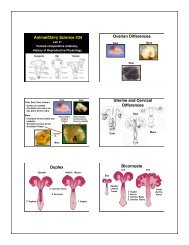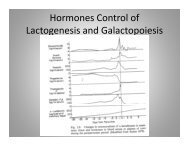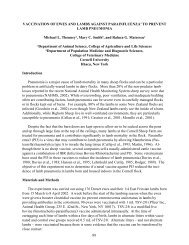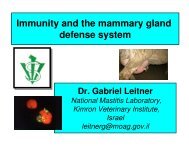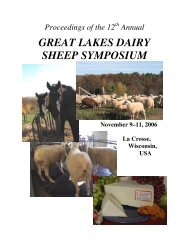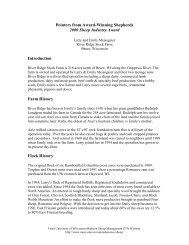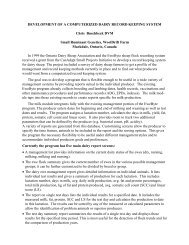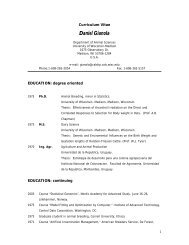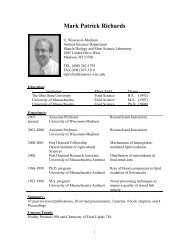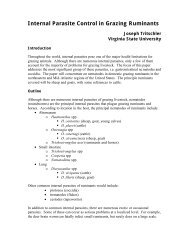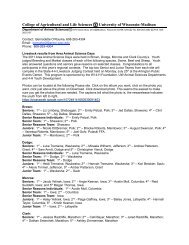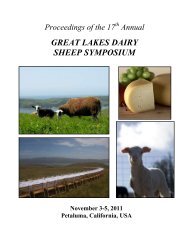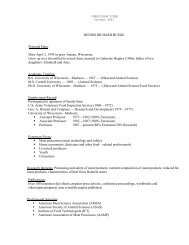Dairy Sheep Symposium - the Department of Animal Sciences ...
Dairy Sheep Symposium - the Department of Animal Sciences ...
Dairy Sheep Symposium - the Department of Animal Sciences ...
You also want an ePaper? Increase the reach of your titles
YUMPU automatically turns print PDFs into web optimized ePapers that Google loves.
TOILET AND WATER SUPPLY<br />
7. Toilet<br />
(a) Each farm must have at least one toilet constructed and operated according to <strong>the</strong> State<br />
code. The toilet must be convenient to <strong>the</strong> milking barn and milkhouse. There must be<br />
no evidence <strong>of</strong> defecation or urination about <strong>the</strong> premises.<br />
(b) The privy may open directly into <strong>the</strong> milkhouse. Toilet room and fixtures must be kept<br />
clean and free <strong>of</strong> flies and odor. All toilet room doors are to fit tightly and be selfclosing.<br />
All outer openings <strong>of</strong> toilet rooms are to be screened.<br />
(c) No evidence <strong>of</strong> human wastes around <strong>the</strong> premises.<br />
(d) Privy covers are to be kept closed. Privy vents are to be screened. Privy pits must be<br />
fly and rodent tight.<br />
8. Water Supply<br />
(a) The water supply must be in compliance with <strong>the</strong> state well code. Reservoirs or storage<br />
tanks shall be constructed <strong>of</strong> impervious material in good repair with approved<br />
screened overflow, shoe box type cover, inlet to be above ground level. New reservoirs<br />
or reservoirs which have been cleaned are to be disinfected before being placed in<br />
service. Wells no longer in use should be properly abandoned following DNR guidelines.<br />
(b) The supply must be approved as safe by a certified laboratory. It must be safe when <strong>the</strong><br />
farm is licensed and must be resampled at intervals <strong>of</strong> not over two years or after any<br />
repair or alteration has been made to <strong>the</strong> water system. Water reports must be on file at<br />
<strong>the</strong> dairy plant and in <strong>the</strong> regional <strong>of</strong>fice.<br />
(c) There must be no cross connection between a safe and questionable supply. There must<br />
be no submersed inlet. This includes siphon type drinking cups, siphon type hog or<br />
poultry waterers and stock tank floats.<br />
UTENSILS AND EQUIPMENT<br />
9. Construction<br />
(a) Milk contact surfaces shall be made <strong>of</strong> stainless steel <strong>of</strong> <strong>the</strong> 300 series, equally corrosion<br />
resistant non-toxic metals or heat resistant glass. Plastic or rubber-like material<br />
must be relatively inert, resistant to scoring, chipping or decomposition and must be<br />
non-toxic and does not impair flavor or odor to <strong>the</strong> product. All milk contact material<br />
must be easily cleaned.<br />
(b) All containers and utensils must be free from breaks, corrosion, and points must be free<br />
from pits or cracks. Bulk tank and freezer <strong>the</strong>rmometers should be accurate within +/-<br />
2ºF.<br />
(c) Single service articles shall be protected from chemicals or o<strong>the</strong>r contaminants. Single<br />
service articles such as strainer material or single service plastic bags are not to be<br />
reused. Plastic bags must be food grade.<br />
(d) Strainers are required to be <strong>of</strong> perforated metal design or so constructed to utilize<br />
single service media.<br />
(e) CIP milk pipeline systems must be approved and installed according to 3-A Standards.



